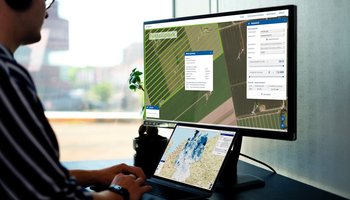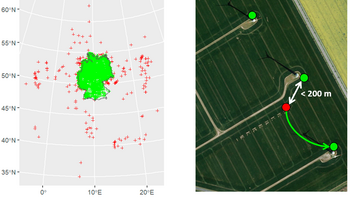Contact
Leibniz University Hannover
Institute for Environmental Planning (IUP)
Prof. Dr. Christina von Haaren
Herrenhäuser Str. 2, 30419 Hannover
Tel.: +49 511 762 2652
haaren(at)avoid-unrequested-mailsumwelt.uni-hannover.de
The conversion of the energy supply system must be designed to be environmentally and landscape compatible, while taking account of human needs. Existing studies of this suffer from major uncertainties and gaps in knowledge. An interdisciplinary team of nature conservation and energy system experts as well as economists will derive nature conservation recommendations for action, particularly with reference to energy savings and prioritising generation, storage and transmission technologies.
The energy transition is one of the key challenges of the 21st century. Conversion of the energy supply system must, however, be designed to be environmentally and landscape compatible, while taking account of human needs. The strong incentive mechanisms over recent years have led to a very dynamic expansion in renewable energies. In order to achieve a harmonisation of the climate change objectives with those of conserving biodiversity, the interests of nature conservation and landscape management must be fully taken into account.
The project "Environmentally compatible power supply from 100% renewable energies 2050 (EE100)" has shown that the established generation routes and spatial regulatory provisions and participation instruments are insufficient for the challenges of an environmentally compatible energy supply.
Amongst the issues to be resolved are the interests of housing estate design and social fairness and participation, but above all an economic view. The options of state incentives and regulations and their long-term impacts on the countryside and therefore nature and landscape are not well enough understood overall. The importance of sufficiency strategies for nature conservation is also not adequately understood at present.
The R+D project will be run by an interdisciplinary team of nature conservation and energy experts as well as economists. One research focus is on the quantification of environmentally compatible electricity production "reserves", which have not been adequately taken into account in previous studies. This applies to the energy output potentials of alternative technologies and uncertainties in existing energy scenarios such as in the area of species protection. Likewise, the issue of external factors and costs of a future environmentally compatible energy system needs to be clarified in comparison to other scenarios.
Research is also required on environmentally compatible designs of networks and storage facilities in the energy system. This is closely linked to the question of the dimensioning and distribution of the storage facilities which will be required due to the volatile production of such large proportions of wind and solar energy. The final main research point focuses on communication. Discussions with various target groups will identify conflicts and obstacles to the environmentally compatible expansion of renewable energies, the adaptation of supply technologies and a changed, energy-aware behaviour (sufficiency). A number of specialist disciplines as well as stakeholders from business and society will be involved in this. Finally, nature conservation recommendations for action will be derived, particularly as regards energy savings and prioritising generation, storage and transmission technologies.
Reserves of environmentally compatible energy output potentials
Uncertainty analysis of existing energy scenarios, particularly in terms of statements about species protection
Designing the transmission network and storage system in the German energy system 2050, subject to a nature conservation compatible energy supply
Variations of the network expansion and use of storage in the German energy system 2050
Economic evaluation of an environmentally compatible German energy system 2050 in comparison – external factors and costs
Energy supply and ecosystem services: use of environmentally compatible energy scenarios for nature and the landscape
Excursus: economic evaluation of governmental action strategies, investments and competing technologies in the transformation process
Improving the knowledge base through workshops and discussion forums
Establishing a strategic partnership of various multipliers with publicity impact (associations, ministries, nature conservation academies, etc.)
Contracting external experts on the topic
Leibniz University Hannover
Institute for Environmental Planning (IUP)
Prof. Dr. Christina von Haaren,
Dr. Julia Wiehe
Herrenhäuser Str. 2, 30419 Hannover
Tel.: +49 511 762 2652
haaren(at)umwelt.uni-hannover.de
wiehe(at)umwelt.uni-hannover.de
Leibniz University Hannover
Institute of Electric Power Systems (IfES)
Electric Power Engineering
Prof. Dr. Lutz Hofmann
Appelstr. 9a, 30167 Hannover
Tel.: +49 511 762 2801
hofmann(at)ifes.uni-hannover.de
Leibniz University Hannover
Institute of Electric Power Systems (IfES)
Electric Energy Storage Systems
Prof. Dr. Richard Hanke-Rauschenbach
Appelstr. 9a, 30167 Hannover
Tel.: +49 511 762 14402
hanke-rauschenbach(at)ifes.uni-hannover.de
Leibniz University Hannover
Institut für Wirtschaftsinformatik (IWI)
Prof. Dr. Michael H. Breitner
Königsworther Platz 1, 30167 Hannover
Tel.: +49 511 762 4901
breitner(at)iwi.uni-hannover.de
TU Berlin
Institute for Landscape Architecture and Environmental Planning
Department of Landscape Planning and Development
Prof. Dr. Stefan Heiland
Straße des 17. Juni 145, 10623 Berlin
Tel.: +49 30/314 21388
stefan.heiland(at)tu-berlin.de
Fraunhofer Institute for Energy Economics and Energy System Technology
Energy Meteorology and Geo Information System, Scenarios and System Modelling
Dr. Carsten Pape
Königstor 59, 34119 Kassel
Tel.: +49 561/7294 265
carsten.pape(at)iee.fraunhoffer.de
Federal Agency for Nature Conservation (BfN)
FG II 4.3 Nature conservation and renewable energies
Alte Messe 6, 04103 Leipzig
Jens Ponitka
jens.ponitka(at)BfN.de
15.02.2023
Weiter

11.10.2022
Weiter

03.02.2022
Weiter
